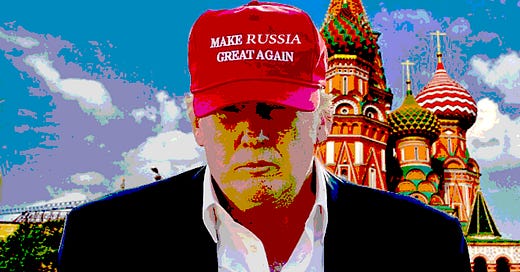
The decision taken by the American right’s MAGA faction to blame Joe Biden for Russia’s invasion of Ukraine is perhaps not surprising—this is a political subculture adept at pinning the blame on Biden no matter how causally unconnected he is from any given bad thing happening in the world.
Far more surprising, according to many, has been the MAGA right’s defense of—and in some cases even praise for—Vladimir Putin.
It shouldn’t have been.
Apologia for a paranoid Soviet spy-turned-authoritarian bent on resurrecting a Greater Russia is exactly what we should have expected from a large segment of MAGA World.
While a bevy of commentary registered surprise at seeing the most vocally pro-American politicians and pundits praising the expansionist leader of an adversarial power, I found their stance consistent with their core tenets—predictable, even.
One cause of their surprise is the widespread misconception that extreme nationalists lack an international agenda. This is often not the case—in fact, their preference is for an international order defined by arch nationalism. The extreme nationalist will suggest, of course, that they merely believe in national sovereignty and object to the liberal erosion of nationhood. But liberals do not reject self-determination, and the system of international laws and norms that these authoritarians sneer at is based on the assumption that nation-states are the organizing unit of global politics.
However, what links them is not merely that they are nationalists but the particular kind of nationalism they envision: dominating, hyper-mythologizing, obsessed with purities, and embattled on all sides by the weakening effects of liberal cooperation and toleration. History is a clear guide in this case.
It was under the banner of a “Pro America Rally” that over 20,000 Americans gathered at Madison Square Garden in New York City on February 20, 1939 and hung an enormous image of George Washington between star-spangled banners and swastikas. Sarah Churchwell, who has elegantly captured the history of America’s dalliance with fascism and the contours of the America First slogan, lays out the dark resonances between American and German extremism at the time:
The Nazis themselves saw a clear kinship. Recent histories have demonstrated that Hitler systematically relied upon American race laws in designing the Nuremberg laws, while the Third Reich also actively sought supporters in the Jim Crow South, although the political leadership of the white South largely did not return the favor. But the correspondence between the two systems was perfectly evident at the time, on both sides of the Atlantic. A Nazi consul general in California even tried to purchase the Klan, with the idea of plotting an American putsch.
More recently, we have seen Viktor Orbán’s Hungary become the darling of many across the various right-wing movements (America First-ers, the Groypers, integralists, and so on are fissured, like the left’s Leninsts, Trostkyists, Mensheviks, Bordigists, and Maoists before them on the left into myriad petty camps and kingdoms). Gladden Pappin, writing in The American Conservative, puts its rather succinctly: “Hungary’s policies—its robust defense of Christianity, the family, its state, its industry, and its borders—are not on their own what has drawn the interest of Western conservatives.” Rod Dreher sums up the challenge as he sees it in the illiberalizing states of central Europe: “They survived one totalitarian attempt to crush the cultural memories that made them distinct peoples, only to find that the forces of post-Christian liberty and capitalism are doing the job more effectively than the Soviets did.”
This constellation of thought, if somewhat vague in its outline, shines a bright light on the nature of right-wing nationalism in America. This nationalism, extreme in its actual purpose and policy, sounds occasionally doting—paternalism being central to virulent nationalism. The family and the worker are to be tended to and nurtured. The nation is to be edified through cultural renewal. It sounds fine enough. But the sinister varicose veins pumping through such a body of thought are impossible to ignore. The nation cannot be stretched to include a certain kind of outsider or to accommodate moral perversities; the state is there to determine what is good and worth nurturing; and projects like the European Union are to be regarded with skepticism and defensiveness, lest they violate the principle of national rule. Democracy, though, doesn’t really enter into it.
Ukraine, of course, is a nation-state. And Russia’s invasion violates the fundamental premise of Ukrainian sovereignty. But Ukraine is not really the right sort of polity for these new ultra-nationalists. It’s a modernizing country, embracing a democratic future and hopeful of membership in the despised and emasculating liberal clubs of the European Union and NATO. As the CEO of Gab, Andrew Torba, put it, “What he really means is Ukraine needs to be liberated and cleansed from the degeneracy of the secular Western globalist empire.”
Putin’s Russia, on the other hand, is exactly the right kind of nation-state. It’s expansionist, paranoid, distrustful of international institutions, and disdainful of what it sees as contemporary history’s bastardization of its fundamental myths. Putin’s Russia is externally hostile toward other powers and internally hostile toward religious minorities and LGBTQ citizens, sometimes viciously so. Pluralism and democracy are at best for fools and at worst for the weak and traitorous who will sell out the nation at any and every opportunity. Putin himself embodies much of this. As historian Timothy Snyder has stressed, “Putin’s favorite philosopher, Ivan Ilyin, had described opposition to his views as ‘sexual perversion,’ by which he meant homosexuality.” And for many of these new American ultra-nationalists, when it comes to Putin, it is a love affair indeed.
I am speaking exclusively about the Russian state and the apparatuses of the Putin regime. People, plainly considered, are human beings who long for and deserve the enjoyment of basic liberties and simple dignity. But the Russian state is another matter entirely. And the Russian state, much like Orbán’s Hungary or the brutal regimes of the past, is the object of affection for American extremists because of what it is and not in spite of it. However, falling for the trap of hating Russians or Hungarians because of the illiberal and even immoral nature of the states that govern them would be to give in to the very impulses that drive ultra-nationalism and the extremisms emerging here in America.
It’s the ultra-nationalists who want to sustain this division of peoples. The great challenge for the partisans of liberal democracy now—and that includes everyone from Adam Kinzinger to Bernie Sanders—is to meet these moral certitudes, pseudo-histories, and quack science with the belief in both individuals and in institutions to sustain the embers of freedom wherever they burn. America’s ultra-nationalists may cheer on Putin. Its patriots will stand with Ukraine.








